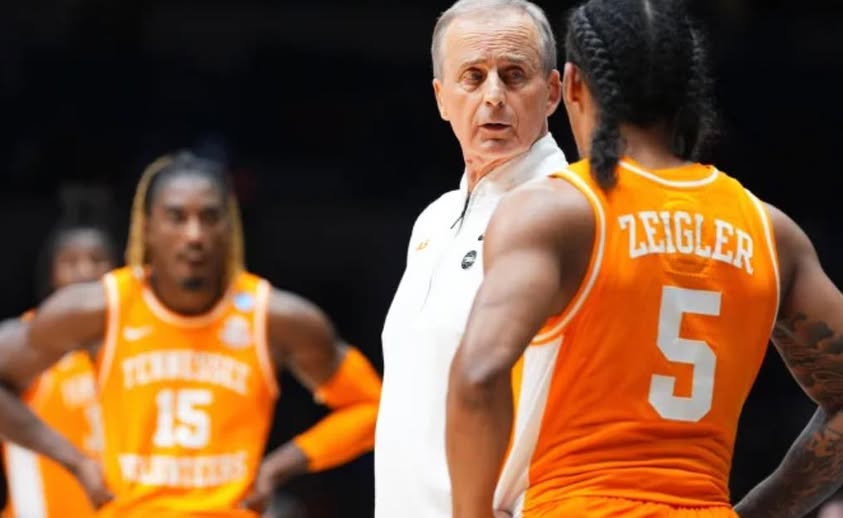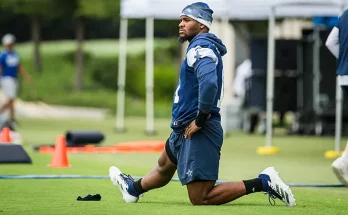Tennessee’s loss to Houston in the Elite Eight is one that will resonate with college basketball fans for some time, not only because it ended the Vols’ hopeful journey to the Final Four but also because it underscored a deeper issue with college sports fandom: an issue that continues to get worse as the lines between entertainment, competition, and personal identity blur.
In the world of college athletics, victories are celebrated as triumphs for universities, their athletic programs, and their fanbases. The losses, on the other hand, are often met with a sense of deep personal betrayal, as if the athletes’ performances are a direct reflection of the fans’ own successes and failures. It’s a mindset that increasingly distorts the nature of college sports and, more troublingly, has fostered an environment where the line between supporting a team and losing sight of the human element of competition has become ever more fragile.
The game between Tennessee and Houston was a typical nail-biter, the type of contest that fans live for. From the opening tip, it was clear that this would be a physical game, with both teams showcasing their prowess on defense. Tennessee came in as the higher seed, but Houston, a perennial powerhouse, was no slouch either. The two teams went toe-to-toe for most of the game, trading baskets, forcing turnovers, and engaging in a battle of wills. But in the final minutes, Houston’s defense stifled Tennessee’s offense, and a critical mistake late in the game gave the Cougars the advantage. It was a heartbreaking end to Tennessee’s season, one that left the team, its coaches, and its supporters reeling.
As is common after a loss, social media became a sounding board for Tennessee fans. The frustration, disappointment, and anger were palpable. What was troubling, however, wasn’t the disappointment — that’s a natural part of the game. What was disturbing was the vitriol, the sense of entitlement, and the outright cruelty that flooded online platforms in the hours and days that followed.
Many fans, disappointed in the outcome, took to their social media platforms to voice their dissatisfaction not only with the team’s performance but also with the coaches, individual players, and even the university’s leadership. Criticism of players is not new — athletes are often held to high standards, and when they fail to meet those expectations, the backlash can be severe. But in recent years, this criticism has taken on a far more personal and malicious tone. Social media platforms like Twitter and Facebook provide anonymity and distance, giving fans the ability to share their thoughts without fear of consequences. And unfortunately, some fans have taken advantage of this, launching attacks that go beyond sport and invade the realm of personal character and dignity.
In the aftermath of Tennessee’s loss to Houston, some fans lashed out at individual players, calling them names, making derogatory comments about their abilities, and, in some cases, even issuing threats. Such behavior is far from isolated. This has become the unfortunate reality for many athletes, particularly in college sports, where the lines between professional athletes and students are often blurred. While these athletes are technically students, they are also expected to perform at a level that rivals professional athletes. This disconnect has led to a dangerous dynamic, where athletes are not viewed as young people who make mistakes but rather as commodities to be criticized, ridiculed, and discarded when they don’t live up to expectations.
This toxic environment is not just the product of social media, though it certainly exacerbates the issue. The relentless pressure to win in college sports — often fueled by media coverage, fan expectations, and even financial incentives — has created a culture of performance at all costs. Universities and athletic departments continue to prioritize winning above all else, frequently at the expense of the athletes’ well-being. Coaches are judged primarily on their ability to produce victories, and players are seen as pawns in the larger game of college athletics.
The reality is that college athletes, particularly those at top programs like Tennessee, are under immense pressure. They have to juggle their academic responsibilities with grueling practice schedules, travel, and media commitments. The emotional and physical toll of playing at such a high level is enormous, and it’s only amplified when fans expect perfection. Fans, however, often forget the human side of the athletes they support. It’s easy to forget that the 20-year-old player who missed the critical free throw is still a student navigating the pressures of life while trying to succeed in a sport that, in many cases, may not lead to a professional career.
It’s also worth noting that the structure of college sports itself fuels this cycle of unrealistic expectations and demands. Many college athletes are recruited on the basis of their potential to lead their team to glory. They are touted as the next big thing, and the pressure to live up to those expectations can be overwhelming. Fans, eager to see their team succeed, often place their hopes and dreams on the shoulders of these young athletes, creating an environment where failure is seen as a personal failure, not just a part of the game.
This mindset is especially troubling because it suggests that fans are losing sight of the purpose of college athletics. College sports should be about education, personal development, and the opportunity for young people to compete at a high level while also pursuing their academic goals. Instead, there is a growing sense that winning is the only thing that matters — and anything less than victory is seen as an embarrassment. This distorted view of college sports not only harms athletes but also damages the integrity of the games themselves. When the joy of competition is overshadowed by the singular obsession with winning, the very spirit of sport is lost.
Unfortunately, this trend is getting worse, not better. With the rise of social media, the pressure on athletes has only intensified. Instant analysis, post-game breakdowns, and fan commentary can be overwhelming, especially when the messages are laced with venom and personal attacks. It’s no longer enough for fans to criticize their team’s performance in a thoughtful manner; now, they must resort to making personal attacks, often crossing the line between constructive criticism and outright abuse.
It’s also important to consider the broader societal impact of this trend. The rise of social media has already led to increased levels of stress and mental health challenges for people of all ages, and athletes are no exception. College athletes, who are often in their late teens or early twenties, are particularly vulnerable to the pressures of social media, where they face not only criticism from fans but also public scrutiny from the media. When the focus shifts from supporting athletes to tearing them down, it fosters an environment of toxicity that can have lasting effects on mental health.
In recent years, we’ve seen an increasing awareness of mental health issues among athletes, with more players speaking out about the pressure they face and the toll it takes on their well-being. But even as the conversation around mental health grows, there is still a significant disconnect between what athletes need and what fans expect. Until fans realize that the players they cheer for are human beings with lives beyond the court or field, the toxic environment surrounding college sports will only continue to grow.
Ultimately, Tennessee’s loss to Houston should serve as a reminder that college sports are about more than just winning. They’re about the athletes who work tirelessly to represent their schools, their teammates, and themselves. It’s time for fans to recognize that their support should be rooted in respect for these athletes as people, not just as performers. The rise of social media and the growing obsession with winning have created a dangerous culture that prioritizes personal success over the well-being of athletes. If we want to see college sports return to their roots — as a place for education, personal growth, and healthy competition — it’s time to start rethinking how we view and treat the athletes who make these games possible. Only by recognizing the humanity behind the jersey can we begin to change the toxic culture that has come to define college sports fandom.



